High-Strength Line Pipe Steel & Welded Gas Pipe Solutions
In the vast landscape of industrial infrastructure, line pipe steel stands as a critical backbone for energy transmission, water distribution, and various industrial applications. Its integrity and performance are paramount for ensuring safe, efficient, and reliable operations worldwide. This comprehensive guide delves into the world of line pipe steel, exploring industry trends, technical specifications, application scenarios, and the advanced manufacturing capabilities embodied by products like the Welded Pipe Production Line.
Industry Trends and the Evolving Landscape of Line Pipe Steel
The global demand for energy, particularly oil and natural gas, continues to drive significant investment in pipeline infrastructure. This sustained growth underpins the crucial role of line pipe steel. According to reports, the global steel pipe market size, valued at approximately USD 170 billion in 2022, is projected to reach USD 240 billion by 2030, with a compound annual growth rate (CAGR) of over 4.5%. This growth is fueled by increasing investments in oil and gas exploration, expansion of water and wastewater treatment facilities, and development of urban gas distribution networks. The market is also seeing a shift towards higher-strength, corrosion-resistant materials to meet more stringent environmental regulations and operational demands.
Innovations in manufacturing technologies, such as advanced welding techniques and sophisticated quality control systems, are transforming the production of line pipe steel. The emphasis is on producing pipes that can withstand extreme pressures, corrosive environments, and seismic activities, thereby extending their service life and reducing maintenance costs. Furthermore, the push for cleaner energy sources and carbon neutrality is leading to increased demand for pipelines capable of transporting hydrogen and carbon capture gases, opening new frontiers for line pipe steel technology.
Technical Parameters and Material Excellence of Line Pipe Steel
Line pipe steel is engineered to meet rigorous specifications to ensure its suitability for transporting various fluids and gases over long distances under diverse conditions. Key technical parameters define its performance and durability.
- Material Grades: Pipes are typically manufactured to specifications such as API Spec 5L, which dictates various grades like API 5L Grade B, X42, X52, X60, X65, X70, and X80. These grades refer to the minimum yield strength (in thousands of pounds per square inch, or psi), with higher numbers indicating stronger steel. Other relevant standards include ASTM A53 (standard specification for pipe, steel, black and hot-dipped, zinc-coated, welded and seamless) and ASTM A106 (seamless carbon steel pipe for high-temperature service).
- Dimensions: Line pipe steel comes in a vast range of diameters (from a few inches to over 60 inches) and wall thicknesses (from thin-walled for low pressure to thick-walled for high pressure and abrasive slurries).
- Pressure Rating: This is a critical parameter determined by the material grade, wall thickness, and operating temperature. Pipes are designed to safely contain specific internal pressures.
- Corrosion Resistance: Depending on the transported medium and external environment, pipes may require specialized coatings or be made from corrosion-resistant alloys. For applications involving corrosive gases or liquids, advanced internal and external coatings are applied.
- Mechanical Properties: Beyond yield strength, other properties like tensile strength (resistance to breaking), toughness (resistance to fracture), and ductility (ability to deform without fracturing) are vital. These are verified through extensive testing.
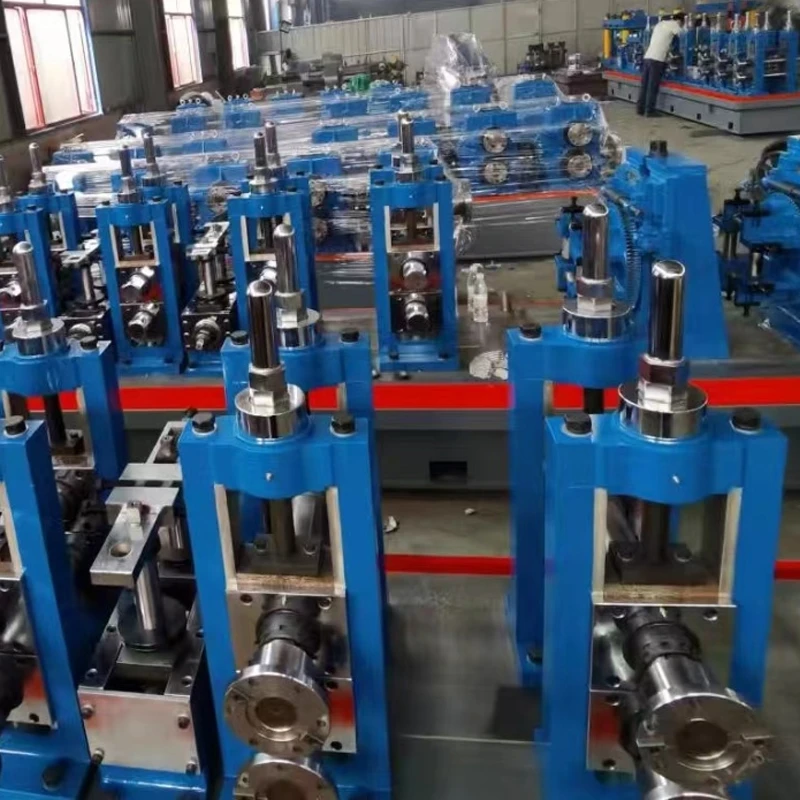
Key Parameters of Line Pipe Steel (Typical Ranges)
| Parameter | Typical Range/Specification | Relevance to Application |
|---|---|---|
| API Grades | API 5L B, X42, X52, X60, X70, X80 | Indicates minimum yield strength; higher grades for higher pressure/stress. |
| Outer Diameter (OD) | 2 inches to 64 inches (50 mm to 1626 mm) | Determines flow capacity and suitability for project scale. |
| Wall Thickness (WT) | 0.125 inches to 1.5 inches (3.18 mm to 38.1 mm) | Impacts pressure containment and structural integrity. |
| Yield Strength (Min) | 35,000 psi (241 MPa) to 80,000 psi (552 MPa) | Resistance to permanent deformation under stress. |
| Tensile Strength (Min) | 60,000 psi (414 MPa) to 90,000 psi (621 MPa) | Resistance to fracturing under tensile load. |
| Charpy V-Notch (CVN) Impact Toughness | Min. 27 J at 0°C (X52) to 50 J at -20°C (X80) | Measures resistance to brittle fracture, especially in cold environments. |
| Material Composition (Key Elements) | Carbon (C), Manganese (Mn), Silicon (Si), Sulfur (S), Phosphorus (P), Niobium (Nb), Vanadium (V), Titanium (Ti) | Influences strength, weldability, and toughness. Controlled to meet specific properties. |
| Corrosion Protection | FBE, 3LPE/3LPP coatings; internal liquid epoxy or cement mortar lining | Protects against internal and external corrosion, extending lifespan. |
| Hydrostatic Test Pressure | Typically 90% of specified minimum yield strength (SMYS) | Verifies pipe integrity and leak tightness under pressure. |
The Welded Pipe Production Line: Engineering Excellence in Action
Producing high-quality line pipe steel, especially welded gas pipe or large-diameter linepipe, requires sophisticated machinery and precise control. The Welded Pipe Production Line is designed to transform steel coils or plates into finished pipes with superior structural integrity and dimensional accuracy. Our advanced production lines, detailed at https://www.xhequipment.com/weldedpipeproductionline.html, incorporate cutting-edge technology to ensure efficiency, reliability, and compliance with the most stringent global standards.
Detailed Process Flow of Line Pipe Steel Manufacturing via Welded Pipe Production Line
The journey from raw steel to finished line pipe steel is a complex, multi-stage process that leverages advanced engineering and automation. Here’s a typical manufacturing process flow for welded pipes:
Simplified Process Flow Diagram (Conceptual)
Coil Feeding → Uncoiling → Leveling → Shearing & End Welding → Looping/Accumulation → Forming (Roller/Cage) → Welding (ERW/SAW) → Sizing & Straightening → Flying Cut-off → End Facing & Beveling → Non-Destructive Testing (NDT) → Hydrostatic Testing → Weighing & Measuring → Coating/Finishing → Marking → Inspection & Packaging
- Coil Preparation and Feeding: Large steel coils are loaded onto the uncoiler. For larger diameter pipes, steel plates might be prepared and fed into forming machines.
- Uncoiling and Leveling: The steel coil is uncoiled and passed through a leveling machine to flatten and remove any curvature or deformities, ensuring a perfectly flat strip for subsequent processes.
- Shearing and End Welding: The ends of successive coils are cut square (sheared) and then welded together to create a continuous strip of steel. This ensures uninterrupted production.
- Looping/Accumulation: A vertical or horizontal accumulator stores a length of the continuous strip, allowing for continuous operation of the forming and welding sections even during coil changes.
- Forming: The flat steel strip enters a series of rollers that progressively form it into an open-seam cylindrical shape. This can be done using various methods:
- Roll Forming (ERW/HFW): The strip passes through sets of forming rolls that gradually bend it into a tube.
- U-ing and O-ing (LSAW): For large diameter pipes, flat plates are first pressed into a U-shape, then into an O-shape.
- Spiral Forming (SSAW): A narrow strip is spirally wound and welded.
- Welding: The formed open seam is now ready for welding.
- Electric Resistance Welding (ERW) / High-Frequency Welding (HFW): For smaller to medium diameter pipes, the edges are heated rapidly by high-frequency current and pressed together to form a forge weld. This process is highly efficient and produces a strong bond without filler metal.
- Submerged Arc Welding (SAW): For larger diameters, especially for linepipe, this process uses a continuously fed electrode and a blanket of granular flux. It produces high-quality, deep-penetrating welds, ideal for high-pressure applications. SAW can be Longitudinal (LSAW) or Spiral (SSAW).
- Sizing and Straightening: After welding, the pipe passes through sizing rolls to achieve the precise final outer diameter and roundness. It is then straightened to ensure linearity.
- Flying Cut-off: A cutting mechanism (saw or plasma cutter) automatically cuts the continuous pipe into predetermined lengths without stopping the production line.
- End Facing and Beveling: The ends of each pipe section are precisely machined (faced) and beveled to prepare them for seamless on-site welding during pipeline construction.
- Non-Destructive Testing (NDT): Critical for quality assurance, NDT methods like ultrasonic testing (UT), eddy current testing, or X-ray inspection are used to detect any internal or external flaws in the weld seam and base material without damaging the pipe. This ensures the integrity of the steel pipe line.
- Hydrostatic Testing: Each pipe is filled with water and subjected to internal pressure significantly higher than its operational pressure. This test verifies the pipe's strength, leak-tightness, and ability to withstand design pressures.
- Weighing and Measuring: Pipes are accurately weighed and measured for length, ensuring they meet specified commercial requirements.
- Coating and Finishing: Depending on the application, pipes may undergo external coating (e.g., FBE - Fusion Bond Epoxy, 3LPE - 3-Layer Polyethylene for corrosion protection) or internal lining (e.g., cement mortar for water pipes) to enhance durability and performance.
- Marking and Inspection: Each pipe is marked with its grade, size, production date, and other relevant information. A final visual inspection confirms compliance with all quality standards.
- Packaging and Dispatch: Finished pipes are bundled or prepared for shipment.
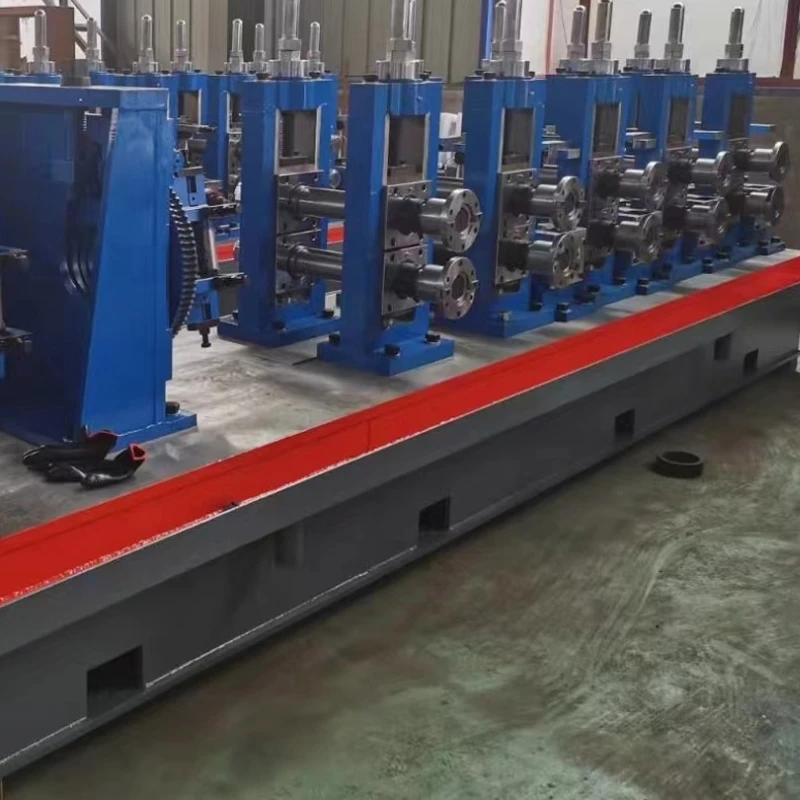
Our Welded Pipe Production Line excels in producing a wide range of pipes, including those for welded gas pipe applications, ensuring material integrity through advanced manufacturing techniques and stringent quality control. The manufacturing process primarily involves precise roll-forming and advanced welding techniques (ERW, HFW, SAW) rather than traditional casting, forging, or CNC machining, which are more common for fittings or components rather than continuous pipe production. Our lines meet and exceed international detection standards like ISO 9001 (Quality Management), API Spec 5L (Specification for Line Pipe), ASTM, and ANSI, guaranteeing the reliability and long service life of the resulting linepipe.
Technical Advantages and Performance Superiority
The Welded Pipe Production Line offers distinct advantages that translate directly into superior line pipe steel products:
- High Automation and Precision: Our lines integrate advanced PLC control systems and automation, ensuring precise forming, welding, and cutting operations, which leads to minimal material waste and consistent pipe quality.
- Versatility in Production: Capable of producing a wide range of diameters, wall thicknesses, and steel grades (e.g., API 5L X80 and beyond), adapting to diverse project requirements, from standard welded gas pipe to heavy-duty linepipe.
- Superior Weld Quality: Utilizing High-Frequency Welding (HFW) or Submerged Arc Welding (SAW) technologies, our lines achieve welds with excellent metallurgical properties, high strength, and minimal defects, critical for the integrity of a steel pipe line.
- Energy Efficiency and Environmental Compliance: Designed with energy-saving components and optimized processes, reducing power consumption and operational costs. Our systems also minimize scrap generation, aligning with modern environmental sustainability goals.
- Extended Service Life and Durability: Pipes produced on our lines exhibit exceptional durability and resistance to harsh operating conditions, ensuring a long service life, typically exceeding 50 years under normal operating conditions when properly installed and maintained. This longevity significantly reduces lifecycle costs.
- Adherence to Global Standards: Our production lines are engineered to produce pipes compliant with major international standards such as API 5L, ASTM, EN, and ISO, making them suitable for global markets and critical applications in industries like petrochemicals and infrastructure.
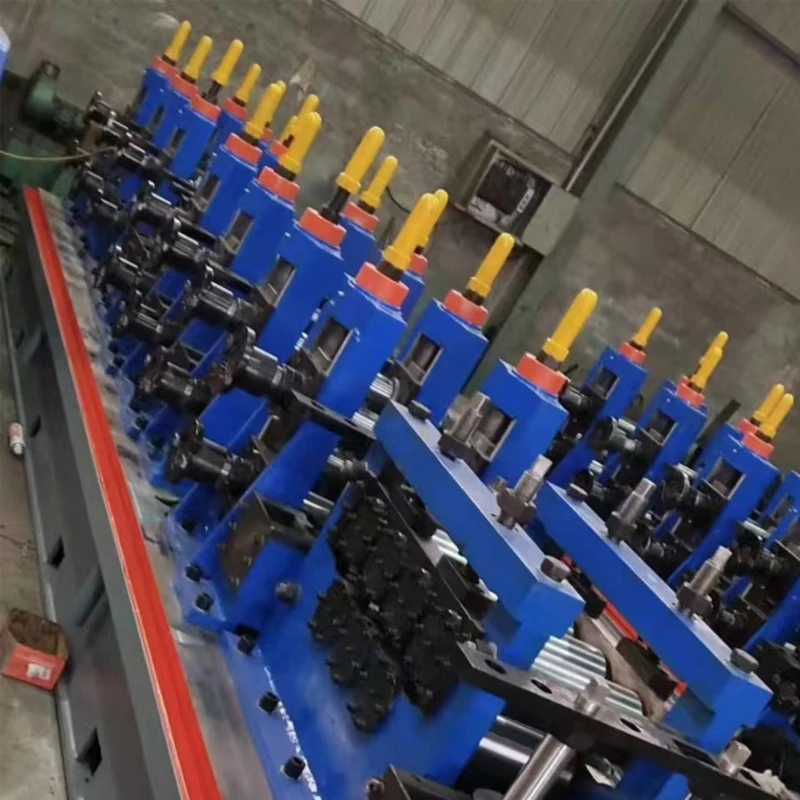
Application Scenarios for Line Pipe Steel
Line pipe steel, fabricated with precision on advanced production lines, is indispensable across numerous industries, serving as the conduits for essential resources and utilities.
- Oil and Gas Transmission: This is the primary application for linepipe. High-pressure, large-diameter pipes transport crude oil, refined petroleum products, and natural gas from extraction sites to refineries, storage facilities, and distribution networks. Pipes produced by our line offer superior pressure resistance and are ideal for long-distance, high-volume transport.
- Water and Wastewater Management: Pipes are used for municipal water supply, irrigation systems, and conveying wastewater. The corrosion-resistant properties and smooth internal surfaces (often achieved with internal coatings) of pipes produced on our line ensure clean water delivery and efficient wastewater removal, minimizing energy consumption for pumping.
- Chemical and Petrochemical Industry: Transporting various chemicals, acids, and bases. Pipes here require specific material grades and coatings to withstand corrosive substances, ensuring safety and preventing environmental contamination.
- Power Generation: Used in cooling water systems, steam lines (requiring high-temperature resistance), and for transporting fuels within power plants.
- Mining and Slurry Transportation: In mining operations, pipes are used to transport mineral slurries (mixtures of solids and liquids). Pipes must have excellent abrasion resistance and robust construction, which our production lines are capable of producing through specialized material handling and welding.
- Urban Gas Distribution: Smaller diameter welded gas pipe is crucial for city gas grids, delivering natural gas to homes and businesses. Safety and leak-tightness are paramount, which our production line ensures through advanced welding and rigorous testing.
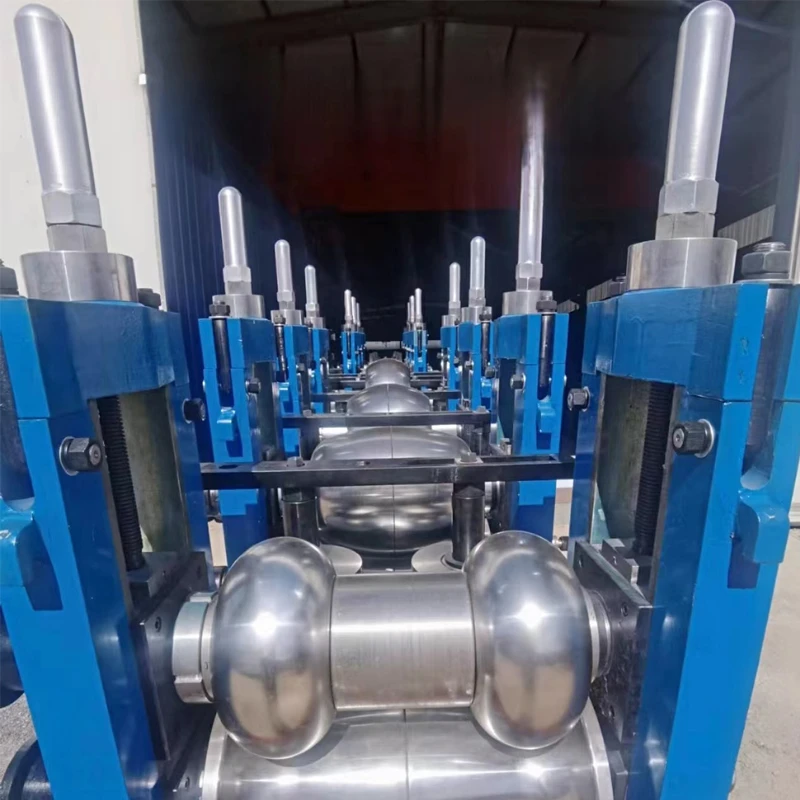
Choosing the Right Manufacturer: Expertise and Trust
When investing in a Welded Pipe Production Line, selecting a reputable manufacturer is paramount. The difference lies not just in the machinery but in the comprehensive support, technological expertise, and commitment to long-term client success. A leading manufacturer of pipe production lines distinguishes itself through:
- Proven Track Record & Experience: Years of experience in designing, manufacturing, and commissioning production lines globally. Look for a manufacturer with a portfolio of successful installations and satisfied clients. Our extensive experience spanning over two decades in the industry showcases our deep understanding of the intricacies of line pipe steel production.
- R&D and Innovation: Continuous investment in research and development to incorporate the latest advancements in automation, welding technology, and material science. This ensures that the production line remains at the forefront of efficiency and quality.
- Comprehensive Service & Support: Offering end-to-end solutions from initial consultation and plant design to installation, commissioning, operator training, and reliable after-sales support including spare parts and technical assistance. This minimizes downtime and optimizes operational efficiency.
- Quality Certifications & Compliance: Adherence to international quality management standards (e.g., ISO 9001) and engineering standards (e.g., CE, UL, GOST). This indicates a commitment to delivering reliable and safe machinery. Our commitment to excellence is reflected in our ISO 9001 certification and our lines' ability to produce pipes compliant with API, ASTM, and EN standards.
- Customization Capabilities: The ability to tailor the production line to specific customer needs, including capacity, pipe dimensions, material types, and integration with existing factory infrastructure.
Tailored Solutions and Customization
Understanding that every client has unique requirements, our approach to providing a Welded Pipe Production Line is highly flexible and solution-oriented. We offer comprehensive customization options to ensure the line perfectly matches your production goals and market demands for line pipe steel, welded gas pipe, or other steel pipe lines.
- Capacity Scaling: Whether you need a high-volume line for continuous production of standard pipes or a versatile line for smaller batches of specialized linepipe, we can design the appropriate capacity and speed.
- Diameter & Wall Thickness Range: Our lines can be configured to produce pipes ranging from small diameters for urban gas distribution to large-diameter pipes for cross-country oil and gas pipelines, accommodating a wide range of wall thicknesses and material grades (e.g., from API 5L B to X80).
- Integration of Specific Technologies: Incorporating advanced features like specific NDT equipment (Phased Array UT, Automatic Eddy Current), advanced cooling systems, or specialized coating application units directly into the line.
- Layout Optimization: Working with your facility layout to optimize space utilization, material flow, and energy efficiency. This includes considering factors like raw material storage, finished product handling, and waste management.
- Material Versatility: Design modifications to efficiently handle different types of steel, including carbon steel, alloy steel, and even certain stainless steel grades, crucial for diverse applications of line pipe steel.
Our engineering team collaborates closely with clients from conceptualization through detailed design, ensuring that every aspect of the production line is optimized for performance, cost-efficiency, and future scalability. This bespoke approach ensures that your investment yields maximum returns and long-term operational excellence.
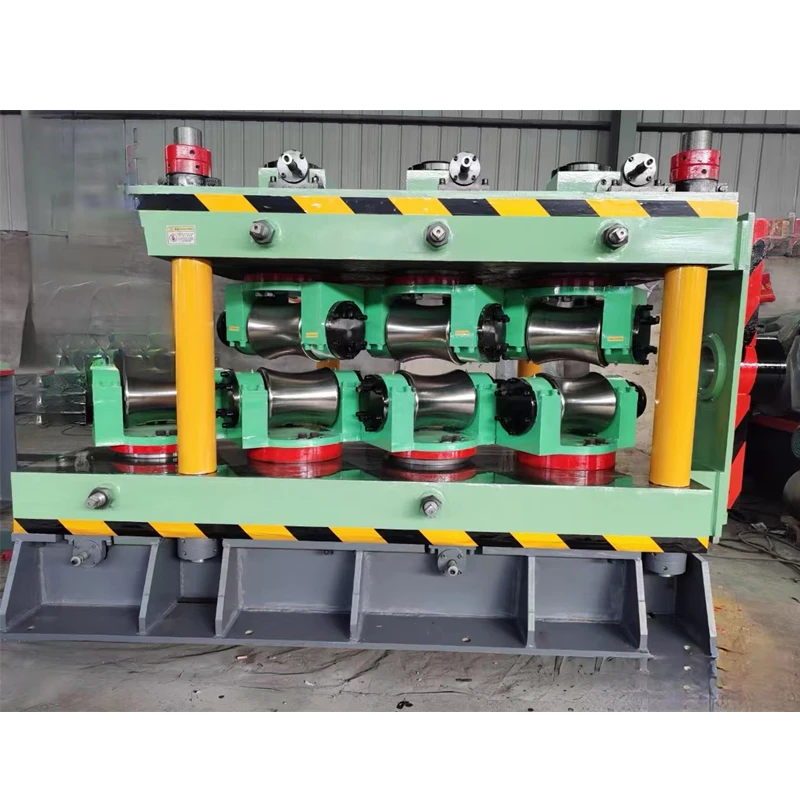
Application Cases and Real-World Impact
The impact of a high-performance Welded Pipe Production Line is best illustrated through its application in real-world scenarios. While specific client names remain confidential, we can outline typical success stories where our technology has played a pivotal role in major infrastructure projects involving line pipe steel.
Case Study Snapshot: Trans-Continental Gas Pipeline Project
A major energy company required a reliable source of high-strength, large-diameter linepipe (API 5L X70) for a new trans-continental gas pipeline spanning over 1,000 kilometers. The project demanded extreme precision, consistent weld quality, and adherence to stringent environmental and safety standards. Our Welded Pipe Production Line, specifically configured for LSAW (Longitudinal Submerged Arc Welded) pipes, was chosen by a key pipe manufacturer involved in the project. The line's advanced automation and integrated NDT capabilities (ultrasonic testing and X-ray inspection) ensured that every meter of line pipe steel produced met or exceeded API 5L and project-specific requirements. This enabled the manufacturer to deliver pipes on schedule, contributing to the timely and safe completion of a critical energy infrastructure project. The superior quality of the welded gas pipe produced significantly enhanced the long-term reliability and operational efficiency of the pipeline, minimizing potential leaks and maintenance needs, thus leading to substantial energy savings during operations due to reduced pressure loss and higher flow rates.
Case Study Snapshot: Urban Water Distribution Network Upgrade
A metropolitan utility embarked on an ambitious project to replace aging water infrastructure with new, corrosion-resistant steel pipe line. They required medium-diameter pipes (ASTM A53 Grade B) with internal cement mortar lining for potable water. Our ERW (Electric Resistance Welded) pipe production line was acquired by a local pipe manufacturer. The line's efficiency and precise forming capabilities allowed for high-volume production of dimensionally accurate pipes. The integrated pre-coating preparation unit and the ability to apply a uniform internal lining facilitated excellent corrosion protection. The project was completed ahead of schedule, providing a reliable and durable water supply network for millions of residents, drastically reducing water loss due to leaks and improving overall system efficiency.
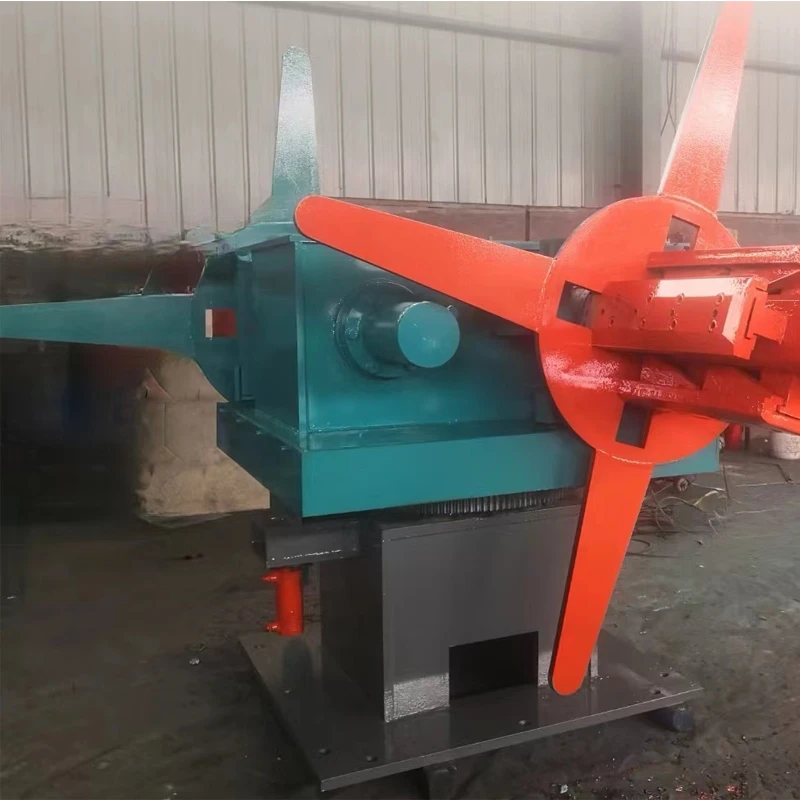
Trust and Reliability: Our Commitment
Building trust is at the core of our operations. We ensure that every aspect of our Welded Pipe Production Line and the line pipe steel it produces upholds the highest standards of reliability and customer satisfaction.
Frequently Asked Questions (FAQ)
Delivery Cycle & Quality Assurance
Our commitment extends beyond just delivering machinery. The typical delivery cycle for a complete Welded Pipe Production Line ranges from 6 to 12 months, depending on the line's complexity and customization. This period includes design, manufacturing, rigorous factory acceptance testing (FAT), and logistics. Upon arrival at your site, our expert engineers provide comprehensive installation supervision and commissioning services, ensuring seamless integration and optimal performance. Full operational training for your staff is also part of our standard offering, empowering your team to master the line efficiently.
We stand by the quality of our equipment with a robust warranty commitment, typically ranging from 12 to 24 months from the date of commissioning, covering manufacturing defects and ensuring peace of mind. Our dedicated customer support team is available to provide ongoing technical assistance, troubleshooting, and expedited spare parts delivery, minimizing any potential downtime and maximizing your return on investment in producing high-quality line pipe steel.
The information and data presented here highlight the critical role of advanced manufacturing in producing high-performance line pipe steel. Our Welded Pipe Production Line embodies the precision, efficiency, and reliability required by today's demanding industrial applications. For more detailed specifications and to discuss your specific project needs, please visit our product page: https://www.xhequipment.com/weldedpipeproductionline.html.
References:
- International Energy Agency. (2023). World Energy Outlook 2023. Retrieved from https://www.iea.org/reports/world-energy-outlook-2023 (Accessed for global energy demand trends influencing line pipe market).
- MarketsandMarkets. (2023). Steel Pipes Market - Global Forecast to 2030. (General market size and growth projections for steel pipes).
- API Specification 5L, 46th Edition. (2018). Specification for Line Pipe. American Petroleum Institute. (Standard for line pipe steel grades and properties).
-
High Frequency Straight Seam Welded Pipe Production Line - BzZhou Xinghua Machinery Equipment Manufacturing Co., LTD. | High Efficiency, Precision Steel Pipe ManufacturingNewsAug.08,2025
-
High-Frequency Straight Seam Welded Pipe Production Line - BzZhou Xinghua Machinery Equipment Manufacturing Co., LTD.NewsAug.08,2025
-
High-Quality Line Pipe Steel for Durable Pipe Line SystemsNewsAug.08,2025
-
High-Frequency Welded Pipe Production Line - BzZhou XinghuaNewsAug.08,2025
-
High Frequency Straight Seam Welded Pipe Production Line|BzZhou Xinghua MachineryNewsAug.07,2025
-
High-Frequency Straight Seam Welded Pipe Production Line-BzZhou Xinghua Machinery Equipment Manufacturing Co.,LTD.|Production Line for φ76-φ89mm Steel Pipes&High-Efficiency WeldingNewsAug.07,2025


